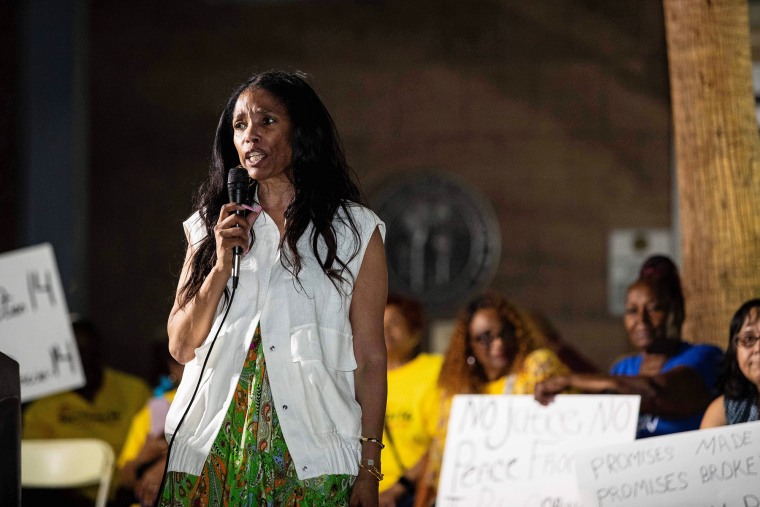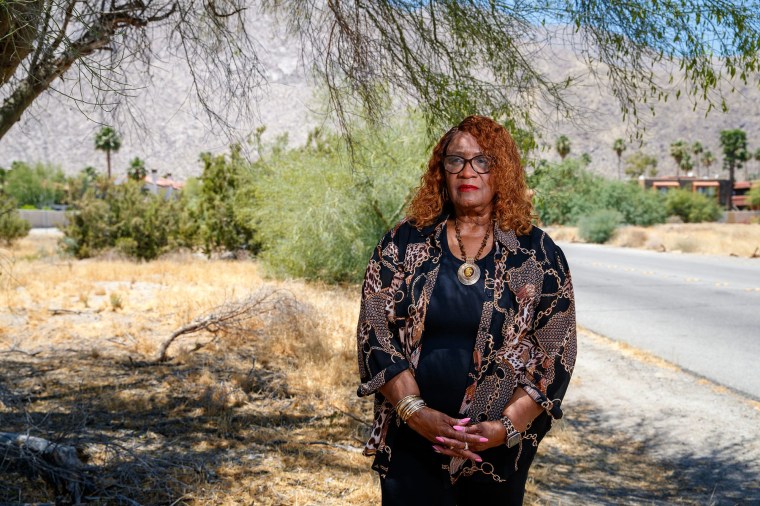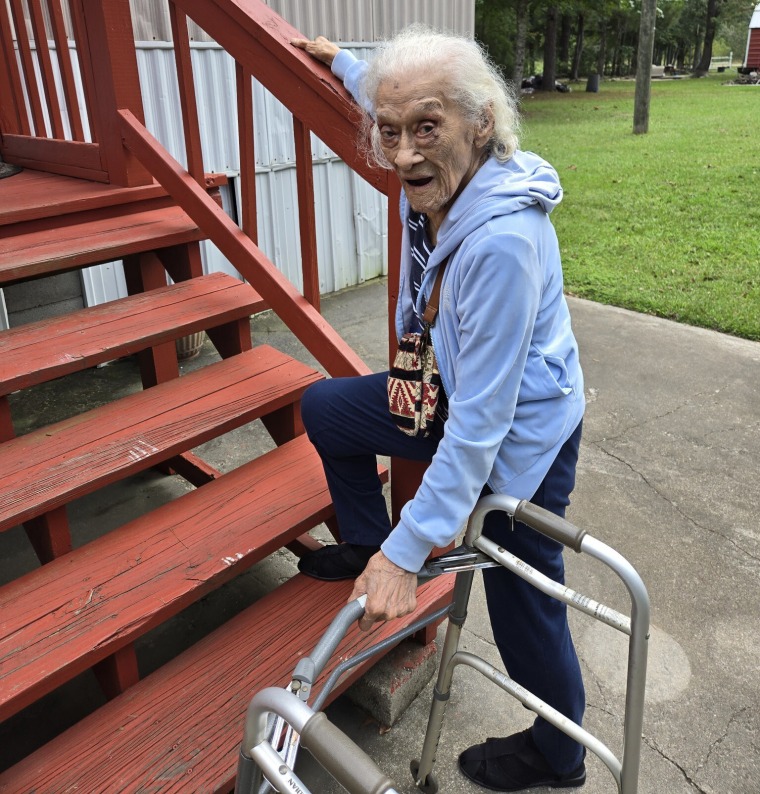A picture from Gloria Holland’s childhood stays clear in her thoughts: a person dressed solely in his underwear, standing exterior his entrance door pleading that his home within the Part 14 space of Palm Springs, California, not be demolished. The person ranted for a number of minutes till a bulldozer leveled the construction and he scampered to security.
“I used to be 8 or 9 years previous,” Holland, now 70, stated from her dwelling exterior Atlanta. “It was the primary time I noticed a grown man cry. It was traumatizing.”
The person and Holland have been amongst 195 Black and Latino households whose properties have been bulldozed and burned to the bottom with little-to-no discover within the late Nineteen Fifties and early ’60s. The land, owned by Native Individuals, had all the time been coveted by metropolis officers, who needed Palm Springs’ downtown space to develop with luxurious inns and retailers in increase a metropolis often known as a celeb playground about 115 miles east of Hollywood.
“On Friday, we have been notified that we needed to take something we needed out of the home by Monday — two days,” Holland stated. “That was it. It was terrible.”
In 2022, the Part 14 Survivors Group filed a criticism towards town, looking for restitution for the lots of of properties misplaced and lives out of the blue upended. Earlier this month, the Palm Springs Metropolis Council unanimously voted to approve a multilevel settlement supply to former residents and descendants of those that lived within the Black and Latino neighborhood.“It’s the duty of town of Palm Springs to compensate people for the destruction of private property,” stated council member Lisa Middleton through the listening to. “We broke one thing that was yours, and now we have to pay for it.”
As a part of the settlement, 1,200 individuals will share $5.9 million in direct money funds. The town additionally agreed to discover naming a group park in honor of the displaced, a public monument to the legacy of the previous residents, and to ascertain a cultural therapeutic heart. The Metropolis Council additionally permitted $21 million in housing and financial improvement packages to deal with previous discrimination towards its Black and Latino residents, which incorporates $10 million for a first-time homebuyer help program and $10 million to ascertain a group land belief.
The town can even fund a $1 million small enterprise program designed for “empowering native enterprise initiatives for marginalized communities.”
“It’s been a journey filled with feelings, from unhappiness, anger, frustration to exhilaration,” stated Areva Martin, the lawyer who represented the Part 14 Survivors for 2 years of their pursuit for justice. “I knew that the dialog round reparations is a tough one for lots of people, notably older Black individuals, a lot of whom have skilled a lot racial trauma, however have been conditioned to reside with it, to not complain about it, to repress it, and in some methods ignore it.”
To guarantee the Metropolis Council understood the influence of the displacement, Martin stated she labored to persuade her purchasers to “inform their tales in ways in which that they had not earlier than, as a result of many of those individuals had by no means stated out loud what occurred to them. They hadn’t instructed their youngsters or their grandchildren. They positively hadn’t talked about it in a public discussion board. However I knew that to heal and to maneuver ahead, we would have liked to acknowledge the harms of the previous.”

Doing so was tough, Holland stated. “Going by means of this example introduced up plenty of feelings and reminiscences I had put away at the back of my thoughts,” she stated. Digging again to the previous appeared to traumatize her another time.
“I’m certain plenty of my neighbors felt the identical manner,” she stated, “as a result of that they had related tales and I may look of their faces and see that they have been seeing it another time.”
Holland stated her mother and father tried to protect the intense nature of the displacement from her and to create normalcy.
“We have been lucky sufficient to be constructing a brand new dwelling and my mom would take me there to see it beneath development,” she stated. “However I needed my previous dwelling again. We had a group there. It was an idyllic place to reside. We felt protected. No medicine. No crime. And so they simply took all that from us.”
Part 14, a sq. mile piece of land, was owned by the Agua Caliente Band of Cahuilla Indians. Due to racial covenants within the 1940, it was among the many few locations Black and Latino residents may reside in Palm Springs. In 1959, the federal authorities opened up leasing agreements for the Agua Caliente Band and different tribes for as much as 99 years, which sparked the curiosity of business actual property builders. Residents labored in numerous professions to assist construct and preserve the Palm Springs infrastructure: carpenters, plumbers, development staff, maids, cooks, gardeners and others in home jobs.
Regardless of that, town, eyeing luxurious tourism, gained management of the land from the tribe by means of a conservatorship and ordered the hearth division to knock down and burn the properties.
In 1969, a California lawyer common’s report described what occurred at Part 14 as a “city-engineered holocaust.”Pearl Devers led the Part 14 Survivors group, beginning in 2021, demanding that town pay for the harms of destroying their group. She fought for her mother and father, who “suffered greater than we did,” Devers stated. “The adults lived by means of that insanity. It tore our household aside.”
Her mom was a maid who labored at one time for legendary actor Lucille Ball. Her father constructed their dwelling in Part 14. However after they have been displaced, her father was rejected for a mortgage to purchase one other dwelling.
Devers’ mom instructed her the pressures from redlining and racism led her father to alcohol. “Our household was crushed,” she stated. “My dad by no means recovered from consuming.” He died at 68.

Devers stated her brothers “missed having their father round,” with out getting particular. She stated she typically wonders what her and household’s life could be like in the event that they have been by no means compelled from their properties.So does Lawrence Williams, 77, who now lives in Columbia, Mississippi. He was “10 or 11” when he opened his entrance door to a person who operated a yellow bulldozer. Williams acquired his mom, Lucille McFarland, who was instructed that they had the weekend to pack up earlier than he returned on Monday morning to destroy their dwelling.
“I nonetheless keep in mind my mom sitting at that desk crying,” he stated. “My mom was a maid and made $1.35 an hour; she didn’t have cash to only up and transfer. She didn’t have a automobile.”
Williams and his youthful brother went to a close-by retailer and introduced again some containers. They helped their mom pack up what they might. Devers’ mother took Williams’ mom home looking, but it surely was tough. She lastly landed a spot about 15 miles north of Palm Springs in a person’s looking trailer that had no rest room or kitchen. They’d to make use of the lavatory of the neighboring fuel station. They endured these circumstances for 3 months earlier than discovering a everlasting place with extra assist from Devers’ mom.
“Traumatizing,” Williams stated. “I feared that entire summer season that I used to be going to finish up having to go to high school there, an all-white college. Speaking about that is like an previous wound that begins bleeding once more.”

McFarland, Williams’ mom, is 101 and lives with him in Mississippi. When her son not too long ago instructed her of the efforts to achieve compensation for being displaced, she stated, “No,” her son stated. “It’s too traumatizing for her. She comes from Mississippi and has seen the Klan. Then that occurred in California. She’s been traumatized her entire life.”The settlement has introduced a way of reduction. Not the cash, the survivors stated, however the public acknowledgement of the harms dedicated.
“Popping out victorious means every thing for our mother and father,” Holland stated. “They stored us standing, fascinated with them on this battle. I instructed Pearl, ‘I don’t suppose I can go one other yr with this.’ We have been drained, touring backwards and forwards to California to battle this. It shouldn’t have taken this lengthy to do the best factor.”
Martin, the lawyer, stated whereas all of them rejoice within the victory, their work isn’t over. They wish to be certain that all of the elements of the settlement come to fruition. She calls this case the “journey of a lifetime.”
“This was led by of us of their twilight years,” she stated. “I imply retired of us, many in wheelchairs, on canes, walkers, failing well being, of us who’ve been marginalized, villainized, forgotten, erased, and for the primary time, seeing that their humanity and their dignity was being acknowledged. That’s the victory.”